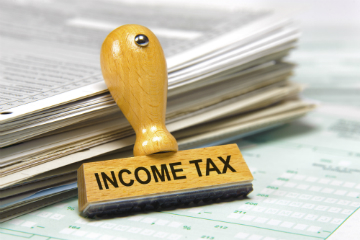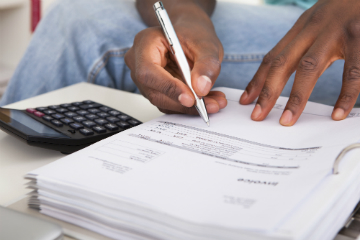Paying Income Tax
 Personal income tax is the money you pay to government from your salary or wages, to help pay for roads, schools, hospitals and other government services. The South African Revenue Services (SARS) manages the collection of taxes and ensures that all working citizens contribute fairly.
Personal income tax is the money you pay to government from your salary or wages, to help pay for roads, schools, hospitals and other government services. The South African Revenue Services (SARS) manages the collection of taxes and ensures that all working citizens contribute fairly.
The 2016 tax season for individuals kicked-off on 01 July 2016.
What happens during tax season?
The tax season runs from July to November every year. For provisional taxpayers who submit via eFiling, it runs until January of the following year.
During tax season, you need to submit an ITR12 form (which is your official Income Tax Return) so that SARS can calculate your tax on your income and the tax-deductible expenses for the year being assessed (1 March 2015 - 29 February 2016).
If, after considering all your income and expenses, SARS determines that you’ve paid too much tax, you’ll receive a refund. If you haven’t paid the full amount due, you’ll be asked to pay the outstanding amount.
For information on how to fill in your ITR12 form correctly, please see:
The important 2016 deadline dates are:
- 25 November 2016 - at your nearest SARS office (non-provisional)
- 25 November 2016 - eFiling (non-provisional)
- 31 January 2017 - provisional taxpayers via eFiling
Here’s what you need to know before you get started on your tax return this year.
The amount of personal income tax that you pay depends on:
- how much you earn,

- your age (whether you’re under 65 or over 65), and
- whether you’re a member of a pension fund or pay towards a retirement annuity fund.
- IRP5/IT3(a) certificate(s) from your employer or pension fund.
- IT3(b) certificates for investment returns.
- Financial statements, if applicable (for example: business income).
- Medical aid contribution certificates and receipts.
- Retirement annuity fund certificates.
- Certificates you received for local interest income earned.
- Logbook and other documents in support of business travel expenses.
- Completed confirmation of diagnosis of disability form (ITR-DD), if applicable.
- Any other relevant income and deduction information.
- Bank account details.
Who qualifies to pay personal income tax?
For the 2016 year of assessment (1 March 2015 - 29 February 2015) you need to pay income tax if you earn an annual salary of more than:
- R73 650 (if you’re younger than 65),
- R116 150 (if you’re 65 or older), or
- R129 850 (if you’re 75 or older).
If you earn less than R350 000 a year, you don’t need to submit a tax return if:
- you receive a salary from only one employer,
- your salary is for a full year of assessment (1 March – 29 February),
- you don’t receive any other form of income, including a travel allowance and/or
- there are no other deductions or payments that need to be claimed.
How do I register to pay income tax?
Register for income tax at a SARS office by completing an IB- IT 77 form. You’ll need the following:
- a certified copy of your South African ID, passport or your driver's licence,
- your bank details: either a cancelled cheque or an original or certified copy of your account statement, or an original letter from the bank confirming your bank details,
- income details for the last 3 years (for example: copies of the IRP5 tax certificate issued by your employer) and then,
- once you’ve been registered and given your tax number, you can register as a taxpayer and fill out your returns online.
 Pay-As-You-Earn (PAYE)
Pay-As-You-Earn (PAYE)
PAYE, or Employees’ tax, is the tax that employers must deduct from the employment income of employees – such as salaries, wages and bonuses – and pay over to SARS monthly. It is withheld daily, weekly, or monthly, when these amounts are paid or become payable to the employees.
It ensures that an employee's income tax liability (amount of tax owed) is settled on an ongoing basis, while the income is being earned. The advantage of this is that the tax liability for the year is settled over the course of the whole year of assessment.
The amount of PAYE you pay depends on how much you earn and is calculated using tax tables issued by SARS.
Tax returns
Once a year, your employer will give you an IRP5 tax certificate that shows the total amount that you earned and the total tax that was deducted.
You need to register with SARS before you complete a tax return. If you’ve already registered, your tax return forms will be sent to you in the post.
You can also collect the forms from your nearest SARS office, or receive and submit your tax returns online using the SARS eFiling system.
What is eFiling?
eFiling is an online tax return and submission service. You can register for eFiling if you’re already registered as a taxpayer.
You’ll need:
- your tax reference number, and
- your official South African ID.
You’ll receive detailed instructions on how to complete the tax return with the forms. When you submit your return, SARS will check that you’ve paid the correct amount of tax.
SARS helps you eFile
What is Help-You-eFile?
Help-You-eFile on the SARS eFiling website allows you, the taxpayer, to ask a SARS agent to share your view of the eFiling screen on your personal computer.
SARS has introduced a mobile app that allows you to:
- register for eFiling,
- submit a tax return (even a complex ITR12 form),
- reset your password,
- view your notice of assessment (ITA34),
- view your Income Tax Statement of Account (ITSA),
- use an online tax calculator, and
- request a correction.
Find out more about the SARS mobile app and how it can simplify your tax returns this year.
 Don't fall for scams
Don't fall for scams
- request your banking details or personal details in any communication that you receive by post, email, phone or SMS; or
- send you any hyperlinks to other external websites - even those of banks.
Not paying tax that you owe to SARS has severe legal implications. You can be fined or imprisoned if you’re found guilty of:
- tax evasion (in other words: not paying your income tax),
- not completing an income tax return, or
- not disclosing all your income on your income tax return.
For more information:
- please see:
- visit the SARS website,
- contact your nearest Western Cape SARS office, or alternatively
- contact the SARS Western Cape Call Centre at 0860 121 218.


